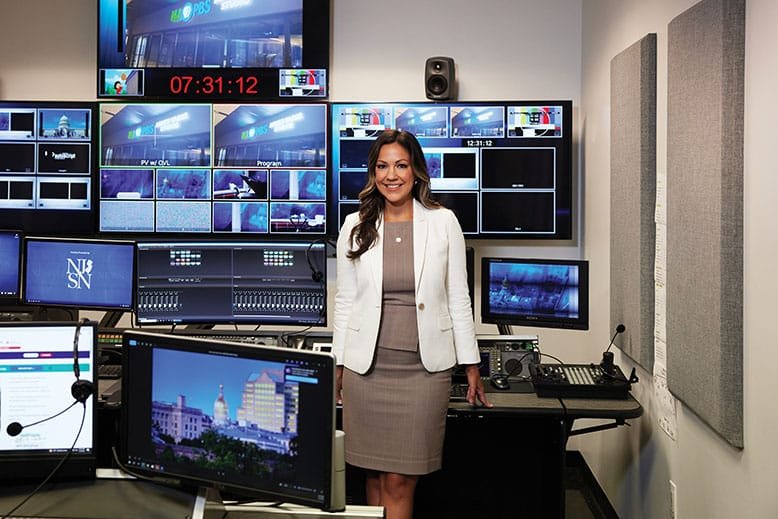Briana Vannozzi makes it look easy. Vannozzi, the anchor of NJ Spotlight News, the nightly news program on NJ PBS, displays a serenity that never betrays the heavy lifting behind each half-hour broadcast or the personal challenges she has overcome.
To be precise, the broadcast runs 26 minutes and 46 seconds. That number—26:46—has been seared in Vannozzi’s mind since she took over as anchor during the Covid-19 pandemic.
On most days, Vannozzi’s job begins as early as 7 am with a text chain among fellow members of the NJ PBS news team. After bundling off her 3-year-old son, J.J., to preschool, Vannozzi drives from her home in Kearny to the PBS studio in Newark’s Gateway Center. In the car, she is already working on her phone. “The conversations,” she says, “never stop.”
At 9 am, Vannozzi attends the first meeting of the day with key members of the editorial team. At 9:45, reporters in the field join a meeting remotely to share what they are working on. At 10, it’s time for hair and makeup. Simultaneously, Vannozzi is on a staff call to discuss future stories.
By 11:30, Vannozzi is settled in at her cubicle reading emails, checking Slack messages, conferring with senior managing editor Jamie Kraft, handing out assignments, prepping for interviews, and writing stories on her laptop. There are decisions to be made. It’s up to Vannozzi and Kraft to determine the stacking, or order, of the show.
“My hand is in a lot of different areas,” she says. “I like the autonomy, and I like being able to shape our product. It’s tricky, too. It’s a lot of juggling throughout the day.”
*
The newsroom is quiet these days. One early summer morning, two associate producers, a graphics editor and a video editor are at their desks, but most of the 50 or so cubicles are unoccupied. Some are barren; even their computer monitors have moved out.
The editorial and production team, which once numbered 44, was reduced to 38 earlier this year due to attrition and a round of staff cuts. Management cut the team again by about one-third in reaction to the rescission bill passed by Congress in mid-July at the behest of the Trump administration. The bill rolled back $1.1 billion in funding from the Corporation for Public Broadcasting, the nonprofit entity that provided about 15 percent of this year’s $10.1 million NJ PBS budget. Additionally, a $1 million appropriation from the state of New Jersey for original lifestyle programs such as Treasures of New Jersey was reduced to $250,000 in the current fiscal year.
“It’s a tough time for public media,” says the 39-year-old Vannozzi, “but we’re not dead.”
A native of Bordentown and a graduate of Bordentown Regional High School, Vannozzi began her broadcasting career with a summer internship at WNJN, an earlier incarnation of NJ PBS, while studying journalism at Ramapo College. Upon receiving her degree from Ramapo in June 2008, she joined WNJN as a desk assistant. That gave her the opportunity to start writing and producing. “I was terrible on camera,” she says of her early field reporting. “Hopefully, those clips don’t exist anywhere.”
After a brief detour covering crime and politics as a correspondent for New York FM radio station News 101.9, Vannozzi returned to New Jersey’s public broadcaster—by then relaunched as NJTV. The new job put her on the Statehouse beat. Vannozzi already had a fascination with politics; covering Trenton was right in her wheelhouse.
Then came the accident.
It was March 2012. Vannozzi was living in Hoboken. A dedicated runner and yoga enthusiast, Vannozzi was walking home one evening from her local fitness club when a taxi turned and struck her in a crosswalk. Thrown to the pavement, Vannozzi suffered a traumatic brain injury called axonal shearing.
Over the course of two “fatiguing and draining” years of almost daily therapy, Vannozzi relearned basic skills, from reading to driving. As she prepared to get back to work, a neurologist warned her against returning to the stress of journalism, but for Vannozzi, there was no other road.
Vannozzi carries no visible signs of her trauma, but acknowledges occasional bouts of aphasia, which can impact her ability to speak. “I try really hard to make sure I’m prepared, so that if I am caught in one of those moments, I have something to fall back on. It’s scary when you’re on set and your mind just has no idea what you were talking about,” she explains. “It’s something I try to keep quiet, because I never want anyone to doubt my abilities. I don’t think at this point that they do.”
The accident only reinforced Vannozzi’s cool demeanor. “I kind of run on a calm vibe,” she says, “but you have something like that happen, and you don’t sweat the small stuff.”
*
At 12:40 pm, Vannozzi heads into the digital production room to interview NJ PBS senior writer Colleen O’Dea. The two are miked up, makeup is touched up and banter is shared. Then they snap on their game faces for a crisp discussion of the just-completed New Jersey primary election.
Next, Vannozzi nails a complicated interview with budget/finance writer John Reitmeyer about the status of the state’s then overdue budget bill. The exchange comes in at exactly the requisite four minutes. “She has a great sense of timing,” says Kraft. Vannozzi calls it “muscle memory.”
O’Dea and Reitmeyer are among the veteran reporters who joined NJTV in 2019 when it merged with NJ Spotlight, formerly an independent, nonprofit news organization. The new entity, rebranded as NJ PBS, operates under the umbrella of the WNET Group, parent of New York’s Channel 13 and Long Island’s WLIW.
Returning to her cubicle, Vannozzi is back on her laptop approving scripts from the field, writing voiceovers, and checking on the progress of graphic elements for the evening’s show. At 1:30, she heads into the front studio to tape headlines and teasers as passersby on the Gateway concourse watch through the studio’s public-facing glass wall.
Then there’s more writing and more headlines to be taped. Much of Vannozzi’s writing is based on stories by the team’s digital reporters, which already have gone live on the NJ Spotlight News website. The best stories can be told in different versions on social media—a central tenet of the station’s forward-looking, multiplatform approach to local journalism.
“We have this great story. If we sit down and do an interview, we can cut that up and put that out as a YouTube short. We can put that on Instagram,” says Vannozzi. “It’s just more ways that we can try to get eyeballs.”
Wherever the audience is reached, Vannozzi says, the NJ PBS mandate is to be “informative, educational and balanced. We want to bring about conversations in a civil way.”
Prior to the pandemic, the nightly news was a live show. Lockdowns forced the team to prerecord the program. It’s been that way since, largely because of budget constraints. A live show requires a larger staff.
“I miss having to be live,” says Vannozzi. “I miss having to think on my feet and having to pivot on a moment’s notice. There really is that adrenaline rush that comes with it.”
The prerecorded NJ Spotlight News airs three times each weeknight, at 6:30, 7:30 and 11. It’s generally the same show each time, unless late-breaking news compels Vannozzi to tape a fresh segment for one of the later airings.
On occasion, Vannozzi still gets to work live. This spring, she moderated the televised debate among the Democratic gubernatorial candidates. And on New Jersey primary night, she anchored the station’s 3 1/2 hours of live coverage of the election results. It was no easy task, considering that both major party races were called by 8:39 pm. That left Vannozzi and a panel of colleagues to fill nearly three hours of allotted time with talk and interviews. “Those are those moments,” says Vannozzi, “where you just take a deep sigh and you buckle in and enjoy the ride.”
Vannozzi stepped into the anchor chair on an interim basis in March 2020, filling in for broadcast veteran Mary Alice Williams, who stepped away to attend to family issues. When the state declared the Covid lockdown, the station set up a remote studio in the living room of Vannozzi’s apartment. By September, she was named the permanent anchor.
Kraft, a veteran of CBS, NBC and CNN, is generous with praise for Vannozzi: “She’s an amazing writer, and she’s quick, with a great sense of story.” What’s more, says Kraft, “her confidence and command are second to none.”
*
The clock is ticking. The show must be in by 4:45 pm.
At around 4, an editor is assembling the show remotely in Asbury Park. It’s running over by four minutes. Vannozzi and Kraft decide to pull a segment.
At 4:35, Vannozzi is munching on a bag of almonds; it’s the first sign of anything remotely like lunch. Moments later, Kraft calls out, “All right, the show is in.” They’ve wrapped just under the wire.
Still, the day isn’t done. Vannozzi does some additional writing for the website and posts abridged versions of select content to YouTube and Instagram. Next, she huddles digitally with Kraft and the associate producers to go over the next day’s lineup.
At 5:20, Vannozzi finally heads home for some quality time with son J.J. “Everyone knows to leave me alone from 6:30 to 8:30,” she says. Finding time with her husband, who is in law enforcement, is another challenge. “We work opposite schedules,” she explains.
Since there’s no telling when news will break, Vannozzi is always on call. She tries to “set boundaries” on her weekend time. “Sunday is sacred,” she says—that is, except for the virtual editorial meetings that take place every Sunday afternoon.
*
Meanwhile, the rescission cuts are presenting NJ PBS with new challenges. “We’re still working out the greater plan,” says director of communications Debra Falk. Another issue is the departure of newsroom leader Kraft, who, Falk says, is leaving “of his own accord,” effective September 30.
Published reports indicate the Corporation for Public Broadcasting is hoping to fill some of its funding gap with additional foundation grants. NJ PBS, too, could look in that direction. (Major funders for NJ PBS include the Robert Wood Johnson Foundation, the PSEG Foundation, RWJ Barnabas Health and the NJ Civic Information Consortium.)
“What we are trying to do is be as resourceful as possible in coming up with contingency plans,” says Vannozzi. For example, the cuts could mean doing fewer stories, but in greater depth. What’s most important, she says, is maintaining credibility.
“There is a skepticism out there about trusting the media,” says Vannozzi. “You need to be able to show that you know what you are talking about, that you’ve done your homework on a subject and that you command it. That goes a long way.”
Editor’s note: The WNET Group announced on September 23 that it has been unable to renew its license with the state of New Jersey to operate NJ PBS beyond the current contract’s expiration on June 30, 2026. NJ PBS news anchor Briana Vannozzi remains under contract with WNET until the license agreement expires.
Ken Schlager is a lecturer at Rutgers University-New Brunswick and the former editor of New Jersey Monthly.






